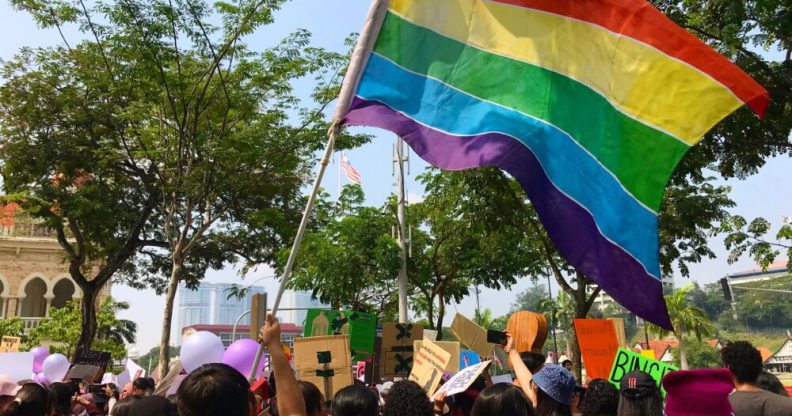Malaysia’s cruel religious ban on gay sex is to be challenged in an historic court case

A LGBTQ+ Pride flag flies at a women’s march in Malaysia. (sumishanaidu/Twitter)
A LGBTQ+ Pride flag flies at a women's march in Malaysia. (sumishanaidu/Twitter)
A man in Malaysia has won the right to challenge a religious state law banning gay sex in the mostly Muslim country.
According to Reuters, a lawyer for the man said on Wednesday (May 27) that Malaysia’s top court had him the go-ahead for the landmark LGBT+ rights test case.
The Muslim man in his 30s will remain anonymous for his protection and privacy.
He initially filed the lawsuit in 2018 after he was arrested for attempting gay sex, a charge that he denies.
He was arrested as part of a raid by by Islamic enforcement officers in the state of Selangor, after which five men pleaded guilty and were fined, jailed and caned on gay sex charges.
Gay sex punishable by up to 20 years in prison in Malaysia.
Homosexuality is doubly illegal in Malaysia as it is banned by the country’s secular, colonial-era legal code, as well as its special Islamic courts.
Punishment includes fines, corporal punishment and up to 20 years in prison.
LGBT+ people have no legal protections against discrimination in the predominantly Islamic country, and the government currently runs a gay ‘rehabilitation programme’, claiming last year that it had ‘cured’ 1,450 people of homosexuality.
The man is challenging the Islamic law in the state of Selangor, the site of his arrest, arguing that the state has no power to ban “intercourse against the order of nature” if civil laws already ban gay sex.
It will be the first case of its kind, and if successful could influence other states in Malaysia.
The man’s lawyer, Surendra Ananth, told Reuters that arguments should be heard by the end of 2020.
He said: “[If we win], the state law will be struck down and the criminal charges in the shariah court should be dropped.”
The Malaysian LGBTIQ+ Network said: “It is clear this state law is being used by authorities to disproportionately criminalise marginalised and persecuted communities based on sexual orientation and gender identity.”

